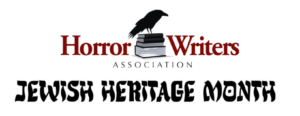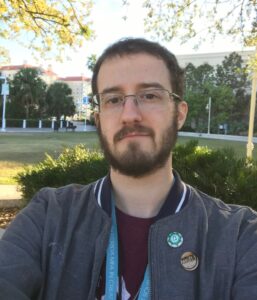

Maxwell Bauman is owner/ Editor-In-Chief of Door Is A Jar Literary Magazine.
Maxwell Bauman earned his BA in English with a focus in Creative Writing from the University of Hartford (2011), and his MA in Fiction and MFA in Publishing from Wilkes University (2014/2015).
Maxwell is a contributor to Chicken Soup for the Soul. He has written several horror books including The Anarchist Kosher Cookbook (Clash Books, 2017), The Mummy of Canaan (Clash Books, 2019), and House of Blood and Teeth (Nictitating Books, 2021).
His Jewish sci-fi/ fantasy novella, The Giant Robots of Babel (Aggadah Try It Books) and YA bisexual romance novel, Gerald Ribbon and the Bird in His Brain (Deep Hearts YA) both came out in 2021.
When not writing, Maxwell makes LEGO art. His piece, “The Anarchist Aleph” was featured in the Association for Jewish Studies’ magazine Perspectives. In 2022, two of his art pieces will be exhibited at the Dr. Bernard Heller Museum in New York City.
What inspired you to start writing?
One summer day before my junior year of high school, I had a really fun day with some friends. Long story short, it started walking along the train tracks, to a swimming pool with some pretty girls, and ended up on the golf course in the middle of the night. And I thought the adventure would make a great story. So I wrote down what happened and just changed all the names. I later learned this literary style is called a roman à clef. And I was smart enough to type it up instead of having to deal with my terrible handwriting and spelling. I showed it to some friends, and they all liked it. They asked what I was going to write next, and since I had fun with it, I kept going. When I kept going after it stopped being fun, I knew I was a writer.
What was it about the horror genre that drew you to it?
My earliest intro to horror was through the B-Movies from Mystery Science Theater 3000. The scares were always surrounded by laughter. I carry that snark with me when I watch most things. But I started writing horror after graduate school. I was playing around with supernatural elements in my writing, so it seemed like a natural step to incorporate more macabre themes. It was also around that time I connected with the Bizarro writing scene. So I had a lot of encouragement to tell wild stories mixing Judaism and horror just as I was finding my voice.
Do you make a conscious effort to include Jewish characters and themes in your writing and if so, what do you want to portray?
I know right away if I story I’m writing will have Jewish characters and themes or not. There’s so much I can portray, it all depends on what that specific story is. For example, The Mummy of Canaan from Clash Books (2019), has a lot of body horror and touched on topics like assimilation and appropriation, while House of Blood and Teeth from Nictitating Books (2021) also has body horror, but I used it in a way to explore a family’s response to grief.
What has writing taught you about how to express your Jewishness or the experiences you’ve had as someone who is Jewish?
I’m a bit of an atypical Jew to begin with. I don’t conform to any particular branch of Judaism like Orthodox or Reform, but I personally identify as “Unaffiliated,” and yes, that’s an option. I don’t feel bad for praying in English instead of Hebrew, and when I do a religious ritual it tends to be a little more on the hippy-dippy side. For example, getting up to physically open the door to welcome in the Sabbath Bride. (You try and do that in a conservative synagogue and they’ll think you’re insane.)
I’ve learned from writing that I can express my Jewish identity any way I want, but the impact all depends on the audience. I remember I was at the Brooklyn Book Festival the year The Anarchist Kosher Cookbook came out. There were people very excited for it, saying things like, “Oh, my Jewish boyfriend would love this!” And then an old Jewish woman came up to the table and looked at the book. She asked if it was a real cookbook, and I explained it was a short story collection with monsters like the golem, and the leviathan, and dybbuks. And when I said “Dybbuks,” she threw the book down and ran away screaming. I didn’t get offended by her reaction, but it helped remind me that there is a wide spectrum of readers, and I don’t have to feel about not trying to appease every one of them.
How have you seen the horror genre change over the years and do you think there’s more that can be done to educate readers and authors on Jewish culture?
The horror genre has grown to include more diversity over the years, but I think that’s in part because so many authors have raised their voices to be included. And as for what more can be done to educate readers and authors about Jewish culture, I think that it’s important to address which part(s) of Jewish culture need more addressing. Do they need more background on bible stories or is it more about the history of the people and how they interact and change when living under the authority of a very different culture? Frankly, I’m a big fan of puppets explaining things; maybe they can put it in a way that would be palatable for the masses.
Following up, how do you think that process will continue to evolve through the years?
It all depends on what kind of terrible things come next in world history. It feels like every conspiracy theory wraps around back to the Jews in one way or another. It’s so easy to hate something you don’t understand. Then it just becomes comfortable and the cycle goes on forever. I like to think there will always be level-headed people willing to educate those who have had this kind of dark fracture with reality.
How do you feel the Jewish community has been represented thus far in the genre and what hopes do you have for representation in the genre going forward?
It feels like Jews have been portrayed as monsters forever. We’ve been demonized directly, like saying we have horns and cloven hooves, (by the way, while this sounds like something out of the Dark Ages, these stereotypes continue to this day. An ex-girlfriend’s grandma checked me for horns the first time we met. But in all fairness, I did have a large Jew-fro, so I could’ve been hiding anything under there…)
And then we’ve been turned into monsters more indirectly, like with werewolves and vampires. The idea of vampires avoiding crosses and drinking blood takes a page from the false blood libel stories that Jews were killing Christian babies to use their blood in rituals or to make matzo. Well, blood isn’t kosher, but that fact hasn’t stopped the narrative.
Moving forward, I would love to see more of these anti-Semitic tropes get combed out, but these fears and hatred are so deep-seeded, it seems like I’m just chasing after wind.
Do you think there is a difference between Jewish horror and horror that is Jewish or are they one in the same? For example, the realism of the Holocaust is horrifying and the otherness that comes with it compared to the folkloric horror of dybbuks, possession and other creatures?
There are a lot of nuances between Jewish horror and horror that is Jewish. It feels a little strange to discuss Holocaust literature through a horror lens. I would be surprised to see nonfiction holocaust book up for horror awards. Can you imagine how crazy people would get?
That idea of otherness is an interesting in relation to the realism of Holocaust writing, but that goes for anything that has a fascist feel. You’ll see and feel that fear of being an outsider come for the main character in something like Bernard Malamud’s The Fixer. It’s also why the fascist in Pan’s Labyrinth is far scarier than any other monster in the movie. Because it’s not just being the outsider that’s scary, it’s being such an outsider to that other people no longer view you as human, and that gives them the ground to do whatever they need to do in order to destroy that which does not belong there.
But then when you talk about folkloric horror and it just seems silly after discussing the very real terror of the Holocaust. But there are people that take things like spirits and threat of possession very seriously. That puts the feeling of otherness on something outside of humanity, and in a way, create a sense of security because that otherness is happening out there, while we’re safe in here doing what we can to ward off the evil eye.
Who are some of your favorite Jewish characters in horror?
I’ve always love monsters like the Golem and the Leviathan. I wrote about both of them in my short story collection, The Anarchist Kosher Cookbook. In the title story I invented instructions for a golem to fight off neo-Nazis. And in the story, “The Leviathan Blues,” I wrote about the relationship between the sea monster mentioned in Genesis and the serpent in the Garden of Eden.
What I’d really love to see more of is the Ziz, which is a giant ancient bird of Jewish folklore. It balances out the trifecta of air, land, and sea with the Behemoth and the Leviathan.
Who are some Jewish horror authors you recommend our audience check out?
Check out John Baltisberger. His personal writing is great like his “Book of Ze’ev” series. (Jewish exorcist in Texas!) John runs Madness House Press, and started its new imprint Aggadah Try It, which publishes speculative Jewish fiction. They published my sci-fi/ fantasy novella, The Giant Robots of Babel (2021). I’m also excited to say that I’m Aggadah Try It’s new lead editor!
What is one piece of advice you would give horror authors today?
Don’t go in there!
And to the Jewish writers out there who are just getting started, what advice would you give them?
Oy, uh … convert?

